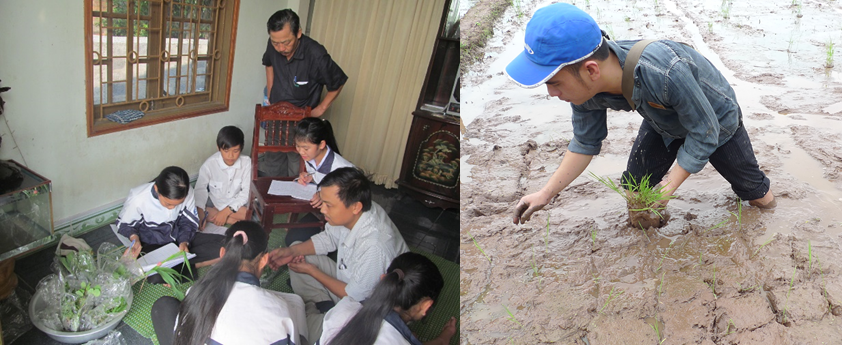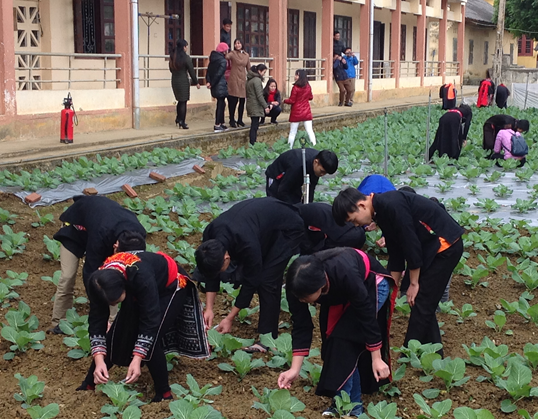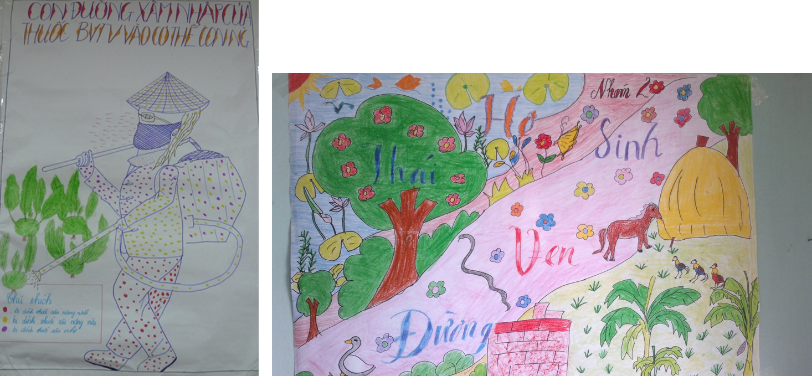COMMUNITY-BASED LEARNING
PARTICIPATORY LEARNING

Participatory learning is an educational approach that is intended to facilitate an reciprocative process of knowledge gathering and analysis. The approach has been used in rural communities in the developing world and has been found to be effective in identifying the valuable perspectives of the rural poor, leading to more practical and sustainable solutions. It also empowers rural poor to share their knowledge with the larger community in an effort to preserve culture and local wisdom.
The first step of this approach is to identify the specific needs of the community. This assessment is through site visits to conduct community survey and interviews with farmers and community members, as well as consulting with local stakeholders and leaders, and collecting scientific data. Following this initial assessment, an action plan is formulated in direct cooperation with community members. If community members themselves formulate and develop the plan, they are more likely to realize and sustain its components into the future.
Participatory learning is an educational approach that is intended to facilitate an reciprocative process of knowledge gathering and analysis. The approach has been used in rural communities in the developing world and has been found to be effective in identifying the valuable perspectives of the rural poor, leading to more practical and sustainable solutions. It also empowers rural poor to share their knowledge with the larger community in an effort to preserve culture and local wisdom.
The first step of this approach is to identify the specific needs of the community. This assessment is through site visits to conduct community survey and interviews with farmers and community members, as well as consulting with local stakeholders and leaders, and collecting scientific data. Following this initial assessment, an action plan is formulated in direct cooperation with community members. If community members themselves formulate and develop the plan, they are more likely to realize and sustain its components into the future.
ACTION RESEARCH
 |
Action research begins by the group or individual selecting a focus or subject of inquiry. This is followed by the development of research questions, and then data collection- involving active engagement with community members. After data is collected, the results are analyzed and reported to the community by the participant-learners. After results are shared, informed action can then be taken in response to the results. Another important aspect of action research is that the learning process is responsive throughout. Perhaps the participant-learners will begin on a certain track, but after collecting actual data, they determine that their initial research questions can be refined in response to the direct needs that have been expressed. It is then up to the group to make the necessary adjustments to their process. |
SCHOOL AS CENTERPIECE
 |
ICERD believes that schools act as community centerpieces. First and foremost, schools provide necessary and responsive educational materials and programs that feed the community knowledge to help them thrive. Schools should also provide opportunities for intergenerational and multicultural exchange of knowledge and experience- not only between parents, teachers, and students, but also among students, farmers, village elders, merchants, and other community members who can actively participate in an cooperative learning process. By creating integrative agriculture-based curriculum frameworks in cooperation with local governing authorities and individual school administrators, ICERD supports these avenues of learning and provides students with a cohesive and comprehensive learning experience. Example of supporting boarding school: Students were trained and practiced to improve the knowledge and skills on ecological agriculture such as agro-biodiversity conservation and use, composting, bio-bedding, biological control, production of botanical pesticides, vegetable production and crop-livestock integration to strengthen nutrient cycling within farms. Agriculture products produced by students are supplied for the student's daily meals and the remains were sold to the market, and the proceeds were used to build the student's fund. |
CURRICULUM DEVELOPMENT
 |
ICERD strongly supports connections between partner organizations and local schools. We consult and often play a central role in the development of localized curriculums that integrate agricultural subject matter and experiential learning, largely based on the 'farmer field school' approach. By working on various levels- with policy makers, administrators, and teachers- we are able to see that these innovative approaches and valuable subject matter is integrated into school curriculums at the primary level and extends to secondary, tertiary, and non-formal educational extensions. We have developed training curriculars as well as organize training of trainers (TOTs) on Farmer Field School (FFS) in some of the sustainable agriculture issues, such as Integrated Pest Management (IPM), Pesticide Risk Reduction (PRR), agro-biodiversity conservation and use, Plant Genetic Resources (PGR) conservation and use, System Rice Intensification (SRI), biological control, composting, bio-bedding, integrated rice-fish/aquatics cultivation, crop-livestock integration, ect. |


